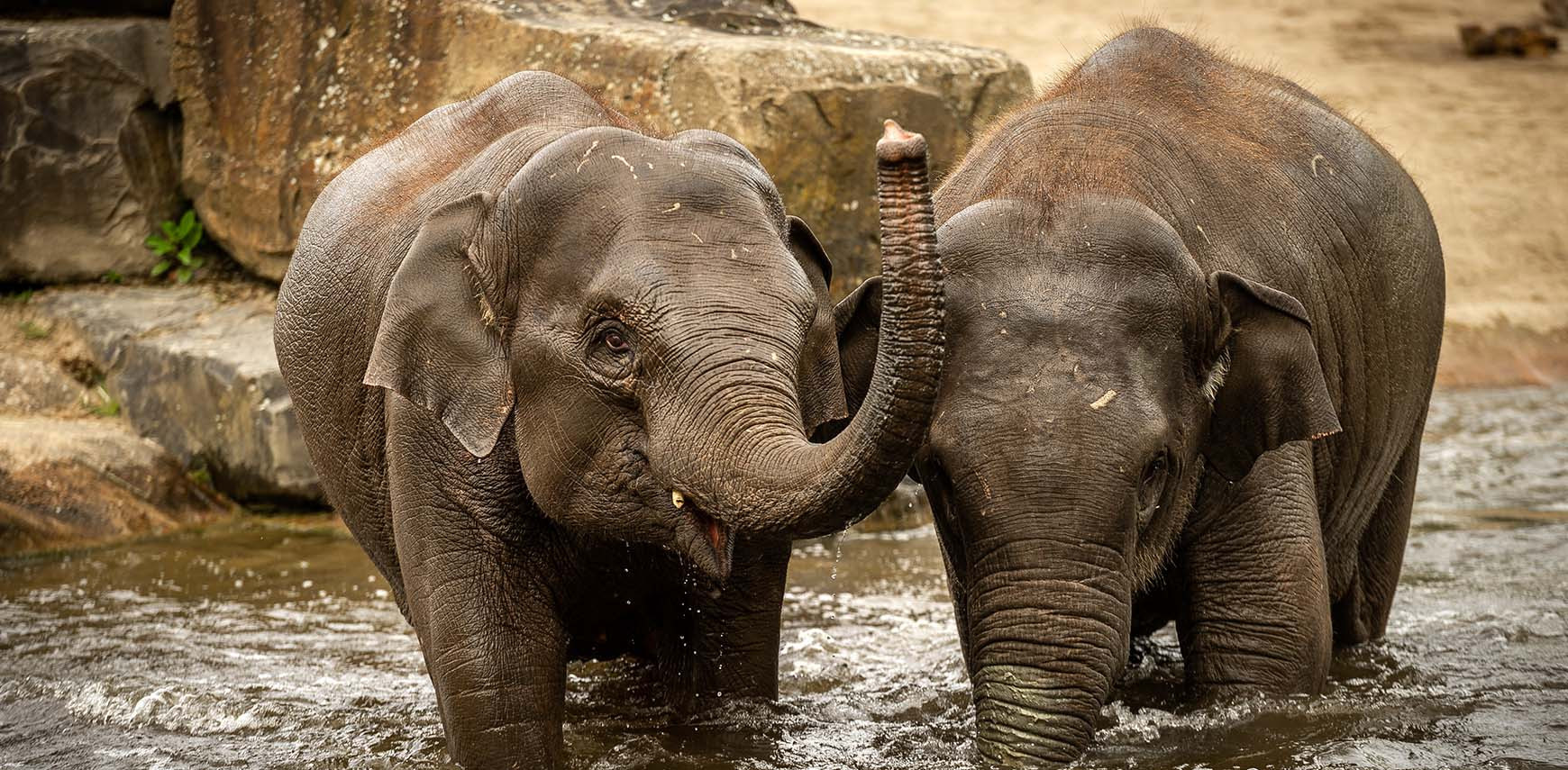Stop EEHV: A big step forward in the battle against elephant herpes
In 2018, a young elephant at Planckendael ZOO called Qiyo died unexpectedly from the consequences of the elephant herpesvirus. This loss deeply impacted both the zoo and its visitors, and marked the start of a large-scale fundraising campaign to promote further research into this deadly virus. Thanks to the support of Planckendael ZOO, scientists have now gained a better understanding of the virus, accelerating the development of a vaccine against it.
Elephant endotheliotropic herpesvirus (EEHV) is a major threat to elephants all over the world, whether they are kept in a zoo or live in nature. Twenty per cent of all elephants born in zoos in Europe and the USA die from this infection. Almost all zoo elephants are carriers of the virus, but lethal infections are becoming increasingly common among wild elephants as well. Elephant herpes is the primary cause of these deaths.
Young elephants between two and nine years of age are the most vulnerable group and are at the greatest risk of being infected with this virus. ZOO veterinarian Jonas Spruyt: ‘Once an elephant is infected with the virus, it remains latent in their system and can reactivate periodically. When the first signs of illness manifest themselves in a calf that is not immune to this disease, this will almost always lead to death. The symptoms are diverse, such as blisters on the tongue, apathetic behaviour or abdominal cramps.’ Once the animals have reached the age of nine, the greatest danger seems to have passed and the disease no longer occurs with clear symptoms. This indicates that the animals are sufficiently immune to the virus, precisely because it remains latent. Stress factors experienced by the herd, such as the loss of a herd mate or a big change in the weather, can trigger a new outbreak.
‘The solution is to develop a vaccine that will make young animals permanently immune to this disease, protecting them from it for the rest of their lives,’ - Planckendael ZOO veterinarian Jonas Spruyt
‘The solution is to develop a vaccine that will make young animals permanently immune to this disease, protecting them from it for the rest of their lives,’ says Spruyt. For this purpose, Planckendael ZOO has joined forces with the Department of Veterinary Medicine of Utrecht University in the Netherlands. The zoo donated nearly 80,000 euros to the research project in the past few years, making them the most significant initiators in the battle against elephant herpes in Europe.
Herpes understood
When Qiyo died at Planckendael ZOO six years ago, very little was known about the elephant herpesvirus worldwide. Today, scientists’ understanding of the virus has increased significantly thanks to intensive research. ‘We now understand how the mechanism works,’ says Willem Schaftenaar, retired veterinarian and clinical elephant expert. ‘Young animals receive antibodies from their mothers at birth, which protects them throughout their first year of life. As they grow older, these antibodies decrease until they are completely gone by the time they are around three years old.’ In order to build their own immunity, the young calf must become infected with the virus during the period when it still has enough protective antibodies from its mother in its blood.
‘The virus can be reactivated when the immune system of an infected elephant is temporary weakened. It can spread, for example, via the airways or the intestinal tract, in order to find a new host. Stress factors are likely to trigger such a reactivation.’ Ironically, stress is beneficial to both the virus and the elephant, as it increases the likelihood of a young elephant becoming infected at the right time and develop immunity.
Valuable blood tests
Planckendael ZOO has been donating blood samples from their elephants to Utrecht University on a regular basis ever since the launch of the project. A detailed analysis of these blood samples has allowed the scientists at this university to develop effective diagnostic tests that allow for the swift detection of the herpes virus. In these tests, a small quantity of blood is applied to a slide, to which the antibodies can bond. Next, a dye is added to the sample. A colour reaction shows that the antibodies are binding to the blood, and that the elephant in question is infected. If the colour reaction fails to occur, one can be reasonably certain that the sample does not contain antibodies against the virus.

The first blood sample taken from Qiyo the elephant played an important role in the development of the herpes tests. Tabitha Hoornweg, a researcher specialised in elephant herpes: ‘Until then, all elephants tested positive. Although this could be correct, we could not be certain. The sample taken from Qiyo was the first that did not contain any antibodies and it was from this sample that we learned why the animal died from the virus.’ The blood sample analyses also showed that elephants with sufficient antibodies in their blood are protected against the virus, with the exception of very young animals. To closely monitor the health of the youngest animals, regular blood testing is of paramount importance. A recent blood test taken from Planckendael ZOO’s two youngest elephants Tun Kai and Suki (both 6 years old) showed that both animals have sufficient antibodies and are currently not at risk of developing elephant herpes.
Vaccine in preparation
Regular testing gives veterinarians and zookeepers considerable peace of mind. However, only a vaccine can save young elephants from an outbreak of the disease. The greatest challenge in developing a vaccine against elephant herpes is that, unlike many other variants, the virus cannot be grown in a laboratory. ‘Previously, in order to develop a vaccine, all one had to do was cultivate a virus, kill it and subsequently inject it as a vaccine. Unfortunately, in the case of EEHV, this is not realistic, and we were forced to adapt our approach.’
After many years of research, scientists now have a good idea of what the vaccine should contain. ‘We now have all the building blocks that can lead to a vaccine,’ says Tabitha Hoornweg. ‘We are proud that we have reached this point after four years of research. Currently, we are waiting for permission from the authorities to test the vaccine on adult elephants. Only when the use of the vaccine in adult elephants has proven to be safe will young elephants at risk of becoming infected with EEHV be vaccinated. It may take several more years before we know for sure whether the vaccine actually protects against the disease.’
Apart from time-consuming, the development of a vaccine is also very expensive. At least 100,000 euros is needed each year to finance the research project. ‘A lot of people love elephants, but raising enough funds for the coming years is a challenge,’ stresses Hoornweg.
Looking to the future
Although elephant herpes still poses a threat to young elephants, the situation has improved considerably compared to six years ago. Diagnostic tests allow for close monitoring of immunity within a herd, allowing rapid intervention as soon as the first symptoms manifest themselves. However, only a vaccine will be able to prevent elephants in zoos from becoming ill or even dying from the EEHV virus in the near future. This prospect is making Schaftenaar optimistic: ‘We have made several attempts without much progress for almost twenty years, but this research is finally bearing fruit.’
To continue this important research, additional financial support is of crucial importance. Donations to the Qiyo Fund can be of the utmost importance in developing a life-saving vaccine to save the lives of young elephants. All contributions, no matter how small, help in the battle against elephant herpes. You too can contribute by making a donation to bank account number BE15 7350 0994 6730.

